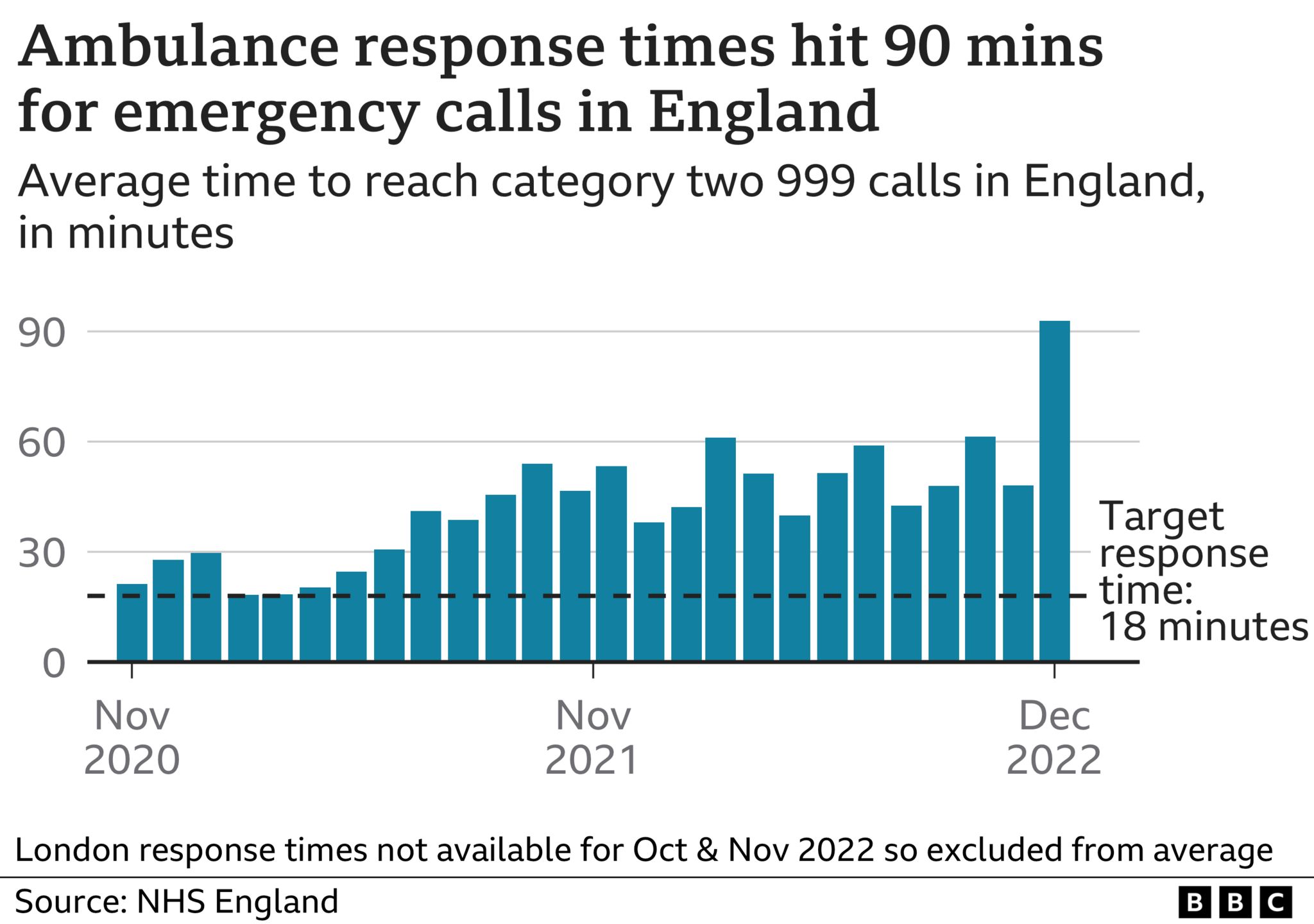bbc.com
By Jayne McCubbin and Nick Triggle
Ambulance bosses have apologised to the family of a man who died after he had a heart attack but no ambulance came.
Martin Clark, 68, started suffering with chest pains at his home in East Sussex on 18 November - before any strike action started in the NHS.
His family rang three times for an ambulance and after waiting 45 minutes drove him in their car to hospital.
When they arrived, the father-of-five went into cardiac arrest and, despite receiving medical attention, died.
His wife, Ann, said while waiting for an ambulance he had been crying out in pain and at one point wrote a note saying: "I don't think I'm going to make it. Love you."
It was excruciating, she said, adding: "He was let down very badly. They should have come."
The case has come to light as NHS England has published figures showing a dramatic deterioration in NHS waiting times amid record demand.

Downing Street said "people will be rightly concerned" by the waiting time figures.
The prime minister's spokesman added the ambulance waits in particular were clearly "not acceptable" and tackling the problems was one of the government's key priorities.
 Image source, Other
Image source, Other
Ms Clark told the BBC's Breakfast programme she constantly wonders what would have happened had an ambulance arrived quickly.
Her husband had had high blood pressure but had been a "fit man".
"He didn't drink. He didn't smoke. He walked every day. That day, he was out there with a chainsaw, cutting the hedge," she said.
"The NHS is broken. Everybody is scared if they get ill where can they turn. Something needs to change - there's going to be so many deaths because of this. It's terrible."
The South East Ambulance Service said: "We are very sorry we were unable to provide a timely response to Mr Clark. Our thoughts are with his family and we will look into this.
"We are working hard to respond to everyone who needs us as quickly as possible while our services remain under significant pressure."
The Healthcare Safety Investigations Branch, which investigates incidents in the NHS, has previously warned about the risk to patients from ambulance delays.
One of the key problems is the long delays crews face at accident and emergency units.
The handover of patients should be done within 15 minutes - but in November, a third of handovers took more than 30 minutes.
By the end of the December, this had risen to more than 40%.
Unions say patient safety is one of the key reasons ambulance staff are striking. Wednesday saw the second walkout of the winter by crews in England and Wales.
"The difference between life and death can be a matter of minutes when someone is having a heart attack or stroke," she said.
"Extreme delays to emergency heart and stroke care cannot become a new normal.
"Healthcare staff are doing all they can - but there aren't enough of them and many will be working in difficult conditions without fit-for-purpose facilities.
"There are no easy solutions but there is a way out of this crisis - if the NHS gets the significant investment it needs to address the vast backlog of heart care.
"It's also vital that we get prevention back on track to stop heart attacks and strokes from happening in the first place."
The Department of Health and Social Care said it could not comment on individual cases but recognised the pressures the NHS was facing following the pandemic and was "working tirelessly" to ensure people received the care they needed.
This included an extra £750m being invested this winter to free up hospital beds and unlock some of the delays in the emergency-care system.
'We couldn't get an ambulance for my husband then he died'
By Jayne McCubbin and Nick Triggle
Ambulance bosses have apologised to the family of a man who died after he had a heart attack but no ambulance came.
Martin Clark, 68, started suffering with chest pains at his home in East Sussex on 18 November - before any strike action started in the NHS.
His family rang three times for an ambulance and after waiting 45 minutes drove him in their car to hospital.
When they arrived, the father-of-five went into cardiac arrest and, despite receiving medical attention, died.
His wife, Ann, said while waiting for an ambulance he had been crying out in pain and at one point wrote a note saying: "I don't think I'm going to make it. Love you."
It was excruciating, she said, adding: "He was let down very badly. They should have come."
The case has come to light as NHS England has published figures showing a dramatic deterioration in NHS waiting times amid record demand.

- Average waits of more than 90 minutes to reach emergency calls such as heart attacks - five times longer than the target time
- Response times for the highest priority calls, such as cardiac arrests,taking close to 11 minutes - four minutes longer than they should
- More than a third of patients in A&E waiting longer than four hours
- One in seven patients waiting more than 12 hours for a bed on a ward when they need to be admitted
- But there has been some progress with the waiting list for routine treatment falling slightly to 7.19m
Downing Street said "people will be rightly concerned" by the waiting time figures.
The prime minister's spokesman added the ambulance waits in particular were clearly "not acceptable" and tackling the problems was one of the government's key priorities.
- Ambulances taking 90 minutes to get to 999 calls
- The NHS crisis - decades in the making
- I worry we're killing people - ambulance dispatcher

Ms Clark told the BBC's Breakfast programme she constantly wonders what would have happened had an ambulance arrived quickly.
Her husband had had high blood pressure but had been a "fit man".
"He didn't drink. He didn't smoke. He walked every day. That day, he was out there with a chainsaw, cutting the hedge," she said.
"The NHS is broken. Everybody is scared if they get ill where can they turn. Something needs to change - there's going to be so many deaths because of this. It's terrible."
- 16:58 - Ms Clark calls 999
- 17:30 - A second 999 call makes clear Mr Clark's condition has worsened
- 17:45 - In a third 999 call, the family say they will drive him to hospital themselves, only to be told by the ambulance service: "We don't recommend you do that"
- 17:55 and 18:01 - The ambulance service ring the home phone back, after the family have left for the hospital, and leave a voicemail saying it has still not identified an ambulance
The South East Ambulance Service said: "We are very sorry we were unable to provide a timely response to Mr Clark. Our thoughts are with his family and we will look into this.
"We are working hard to respond to everyone who needs us as quickly as possible while our services remain under significant pressure."
The Healthcare Safety Investigations Branch, which investigates incidents in the NHS, has previously warned about the risk to patients from ambulance delays.
One of the key problems is the long delays crews face at accident and emergency units.
The handover of patients should be done within 15 minutes - but in November, a third of handovers took more than 30 minutes.
By the end of the December, this had risen to more than 40%.
Unions say patient safety is one of the key reasons ambulance staff are striking. Wednesday saw the second walkout of the winter by crews in England and Wales.
'Extreme delays can't be new normal'
Dr Sonya Babu-Narayan, of the British Heart Foundation (BHF), said cases such as the Clarks' were "incredibly distressing"."The difference between life and death can be a matter of minutes when someone is having a heart attack or stroke," she said.
"Extreme delays to emergency heart and stroke care cannot become a new normal.
"Healthcare staff are doing all they can - but there aren't enough of them and many will be working in difficult conditions without fit-for-purpose facilities.
"There are no easy solutions but there is a way out of this crisis - if the NHS gets the significant investment it needs to address the vast backlog of heart care.
"It's also vital that we get prevention back on track to stop heart attacks and strokes from happening in the first place."
The Department of Health and Social Care said it could not comment on individual cases but recognised the pressures the NHS was facing following the pandemic and was "working tirelessly" to ensure people received the care they needed.
This included an extra £750m being invested this winter to free up hospital beds and unlock some of the delays in the emergency-care system.
